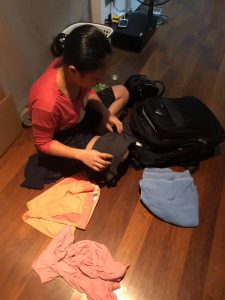by Dan Martin
Millions more people have been ordered to stay indoors as China battles to curb the spread of a new virus that authorities said Wednesday has already killed nearly 500 people.
With more than 24,000 cases in China, a growing number of cities have been imposing a range of restrictions in recent days far from central Hubei province, the epicentre of the outbreak, as authorities struggle to contain the virus.
Global concerns have risen as more countries found cases that were not imported from China and 10 people tested positive for the virus on a ship quarantined off the coast of Japan.
Some 56 million people in Hubei have been under virtual lockdown since last week, with its capital Wuhan at the heart of the health emergency.
In Hangzhou, some 175 kilometres (110 miles) southwest of Shanghai, green fences blocked streets near the headquarters of Chinese tech giant Alibaba as a fighter jet circled overhead.
Alibaba, one of the world’s most valuable companies, appeared shut down, while deliverymen moved in and out of the nearby fenced-in residential areas to drop off groceries. Many people were also seen going out.
The firm is inside one of three districts where some three million people were told this week that only one person per household would be allowed outside every two days to buy necessities.
“Please don’t go out, don’t go out, don’t go out!” blared a message on a loudspeaker urging people to wear masks, wash their hands regularly and report any people who are from Hubei — a common fear in other parts of the country that people from the province might infect others.
At least three other cities in eastern Zhejiang province — Taizhou, Wenzhou and parts of Ningbo — have imposed the same measures, affecting some 18 million people.
Similar policies were encouraged by authorities in two cities as far as China’s northeasternmost province, Heilongjiang, and a handful of others along the east coast.
In Henan province, which borders Hubei, a district in the city of Zhumadian decided that only one person could leave each household every five days. Residents there have been offered cash rewards for informing on people from Hubei.
– Global jitters –
The disease is believed to have emerged in December in a Wuhan market that sold wild animals, and spread rapidly as people travelled for the Lunar New Year holiday in January.
The death toll has steadily increased, rising to 490 in China after Hubei reported 65 more people had died.
Most deaths have been in the province and officials have noted that the death rate, at around two percent, is below the mortality rate of the Severe Acute Respiratory Syndrome.
The new coronavirus is from the same family of pathogens as the one that causes SARS, which killed some 800 people in 2002-2003.
The epidemic has prompted the World Health Organization (WHO) to declare a global health emergency, several governments to institute travel restrictions, and airlines to suspend flights to and from China.
United and American Airlines said Wednesday they have added Hong Kong to their China flight suspensions.
On Wednesday Japan said at least 10 passengers on a cruise ship carrying 3,711 people have the virus.
Japanese authorities began testing those on board after a former passenger who disembarked in Hong Kong was diagnosed with the illness.
British Foreign Secretary Dominic Raab on Tuesday advised Britons to leave China “if they can”, to minimise their risk of exposure to the virus.
– ‘Window of opportunity’ –
But the WHO said Tuesday that dramatic measures taken by China offered a chance to halt transmission.
WHO chief Tedros Adhanom Ghebreyesus said that the great majority of cases are in China.
“That doesn’t mean that it won’t get worse. But for sure we have a window of opportunity to act,” he said.
Singapore, Malaysia, and Thailand all reported new infections not imported from China on Tuesday.
Two fatalities have been reported outside the mainland, in Hong Kong and the Philippines.
Semi-autonomous Hong Kong has closed all but two land crossings with the Chinese mainland.
As countries battle to keep the virus off their shores, the WHO chief accused wealthy countries of falling short on their duties in sharing data.
“Of the 176 cases reported outside China so far, WHO has received complete case report forms for only 38 percent,” he said.
burs-lth/rox/qan
© Agence France-Presse
/AFP












